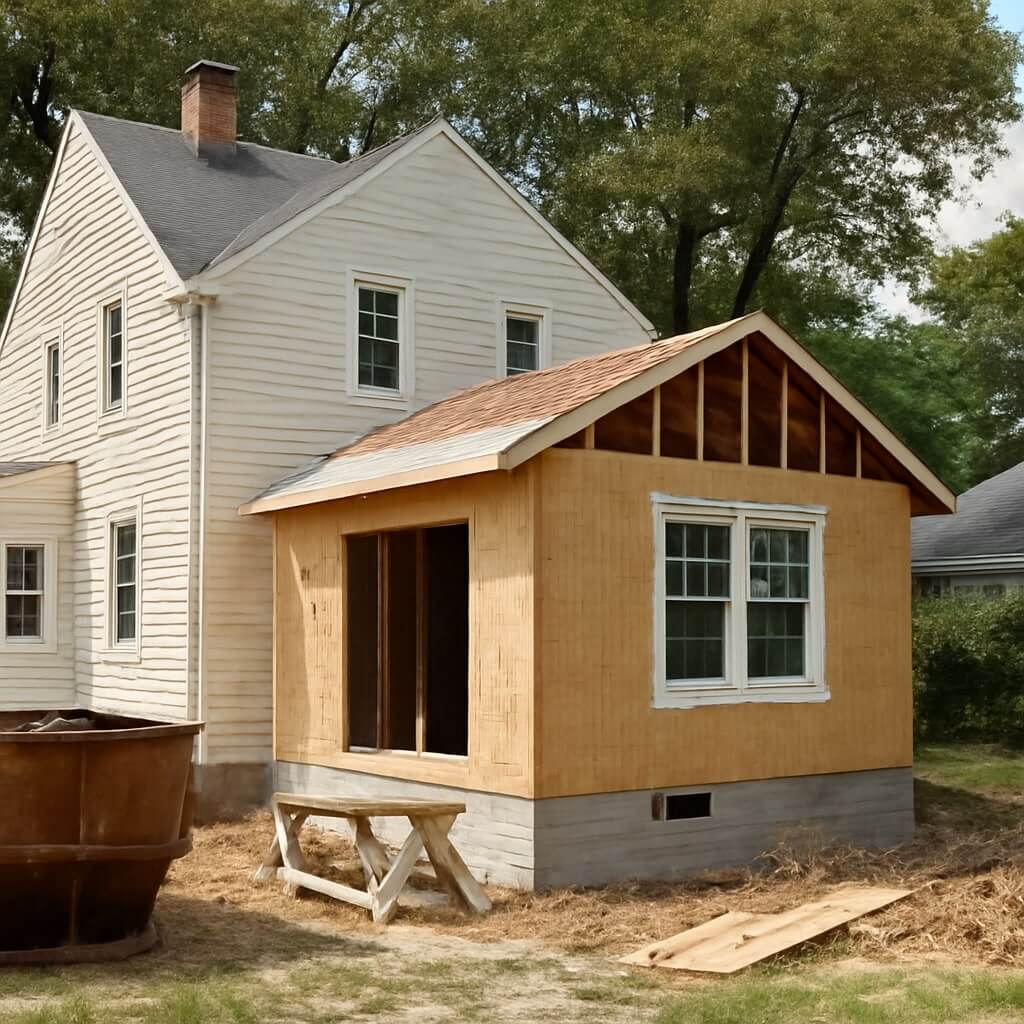When considering a home addition in Norfolk, you’re likely to encounter a variety of costs that can impact your budget. From essential permits to design fees and labor expenses, each element plays an important role in the overall price tag. Understanding these factors is essential for making informed decisions. However, there’s more to the equation than just initial estimates—unexpected costs can arise, influencing your project’s feasibility and scope. What should you really be prepared for?
Key Takeaways
- Home addition costs in Norfolk vary based on size, design, and materials, typically ranging from $100 to $300 per square foot.
- Required permits and fees in Norfolk can add significant expenses; check local regulations to budget accordingly.
- Design and architectural fees for home additions can account for 15-20% of the total project cost in Norfolk.
- Labor costs in Norfolk typically range from $30 to $70 per hour, depending on the contractor’s experience and demand.
- Always budget for unexpected expenses, which can arise during construction, potentially impacting your overall project budget.
Understanding the Basics of Home Addition Costs
When considering a home addition, it’s essential to understand the various costs involved, as they can greatly impact your budget and overall project outcome.
First, evaluate how the addition will affect your home value; a well-planned project can markedly increase your property’s worth.
Next, consider the project timeline—delays can inflate costs and disrupt your life.
Be realistic about labor, materials, and unforeseen expenses.
By grasping these fundamentals, you’ll not only stay within budget but also guarantee a smoother process, maximizing both your investment and the enjoyment of your new space.
Prioritize planning to achieve the best results.
Permits and Fees: What You Need to Know
Before diving into your home addition project, it’s vital to understand that obtaining the necessary permits and paying associated fees can greatly influence your overall costs.
You’ll need to complete a permit application that outlines your project details and adheres to local building codes. Familiarizing yourself with the fee structure is important, as it varies by municipality and can include costs for inspections and processing.
Failing to secure the right permits can lead to costly fines or delays. So, make certain you factor these expenses into your budget to guarantee a smooth and legally compliant construction process.
Design and Architectural Fees
Once you’ve secured the necessary permits and fees, it’s time to contemplate design and architectural fees, which can greatly influence your overall budget.
Hiring a skilled architect guarantees your home’s addition aligns with current design trends and desired architectural styles. Their expertise not only enhances aesthetic appeal but also maximizes functionality, potentially increasing your home’s value.
While these fees may seem intimidating upfront, investing in quality design pays off in the long run.
Investing in quality design may seem daunting, but it significantly enhances your home’s value over time.
Consider collaborating with professionals who understand your vision, as their insights can refine your project and help you avoid costly mistakes down the road.
Construction Costs: Labor and Materials
As you plunge into the nitty-gritty of your home addition project, understanding construction costs—both labor and materials—becomes essential for maintaining your budget. With fluctuations in the labor market and rising material prices, it’s vital to gather accurate estimates. Here’s a quick overview to help you navigate these costs effectively:
| Cost Component | Estimated Cost per Unit | Factors Influencing Cost |
|---|---|---|
| Labor (per hour) | $30 – $70 | Skill level, availability |
| Lumber (per board) | $3 – $7 | Supply chain, demand |
| Drywall (per sheet) | $10 – $15 | Quality, brand |
| Concrete (per yard) | $100 – $150 | Location, market conditions |
| Roofing (per sq. ft.) | $5 – $10 | Material type, installation complexity |
Additional Expenses to Consider
While you may have budgeted for the primary construction costs, it’s crucial to take into account additional expenses that can greatly influence your overall investment in a home addition.
Unexpected expenses, like permit fees or structural adjustments, can arise during the process. You should also consider the costs for landscaping, interior finishes, or even temporary accommodations if you need to vacate your home during construction.
Exploring financing options can help manage these unforeseen costs, ensuring you’re prepared for any surprises. By factoring in these additional expenses, you can better align your budget with the true cost of your home addition project.
Budgeting for Your Home Addition Project
When budgeting for your home addition project, it’s essential to start by determining your overall budget.
Don’t forget to factor in the costs of permits, which can vary greatly depending on your location.
Finally, get a clear estimate of construction costs to guarantee your project stays within financial limits.
Determine Your Budget
Before you plunge into your home addition project, it’s essential to determine a realistic budget that aligns with your financial situation and goals. Start by evaluating homeowner expectations and project timelines to avoid surprises later. Here’s a simple breakdown to guide your budgeting:
| Expense Category | Estimated Cost |
|---|---|
| Design & Planning | $2,000 – $5,000 |
| Construction Costs | $100 – $200/sq ft |
| Finishing Touches | $10,000 – $30,000 |
Factor in Permits
In your budgeting process, it’s important to factor in the costs for permits required for your home addition. Different permit types, such as building, electrical, and plumbing permits, can greatly impact your overall expenses.
Each permit comes with its own fee structures, which can vary based on your location and the scope of your project. Ignoring these costs could lead to unexpected financial strain.
By researching and understanding the specific permits needed for your addition, you can guarantee your budget is thorough, preventing delays and additional fees down the line.
Plan accordingly to keep your project on track and within budget.
Estimate Construction Costs
Estimating construction costs is essential for a successful home addition project, as it directly influences your overall budget and timeline.
Accurate cost estimation helps you manage your project effectively, preventing unexpected expenses.
Here are key factors to take into account:
- Labor costs and contractor fees
- Material selection and quality
- Design complexity and permits
- Contingency budget for unforeseen issues
Conclusion
When planning your home addition in Norfolk, it’s essential to take into account all potential costs, from permits to labor and materials. By understanding these expenses and budgeting for the unexpected, you can avoid financial surprises and guarantee a successful project. Investing in quality design and skilled labor will pay off in the long run, enhancing both your home’s functionality and value. So, take the time to plan carefully and make informed decisions for a worthwhile addition experience.

